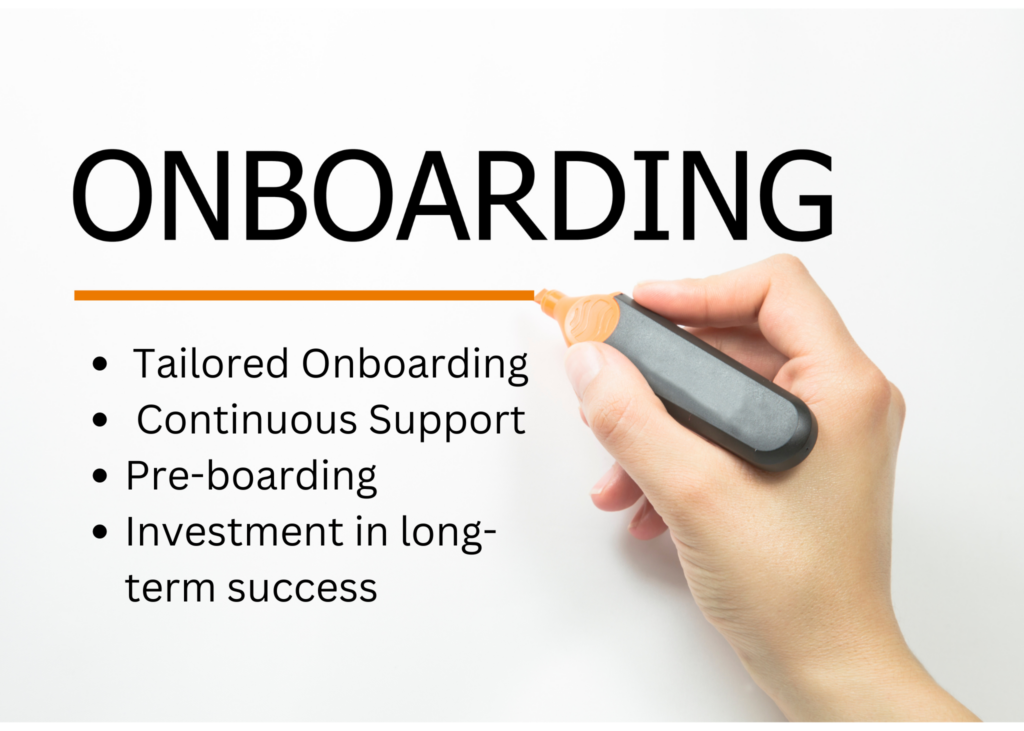Onboarding is one of the most critical stages in the employee life cycle. It’s the process of getting new hires up to speed with how the company works, their role within the organization, and what’s expected of them. A successful onboarding experience lays the foundation for a strong employer-employee relationship, setting the tone for the entire tenure of the new hire.
It is vital to create an effective onboarding process that not only helps new employees feel welcome but also empowers them to succeed in their roles. Consider tailored onboarding to meet each employee’s needs. Onboarding is not just for the initial introduction, continue to guide your employees through the transition. Transversely, onboarding does not begin on day one of employment. It is important to set the stage before day one. Onboarding is an investment in long-term success of your employees and your organization.
Tailored Onboarding: Meeting Each Employee’s Needs
No two employees are the same, and neither should their onboarding experiences be. A one-size-fits-all approach to onboarding can leave new hires feeling overwhelmed or underprepared. Instead, consider customizing the onboarding process to meet each employee’s specific needs.
Tailor the training to the specific responsibilities and expectations of the new hire’s role. This helps them understand how they can contribute to the company’s goals from day one.
Personalized Learning Plans: Develop individualized learning plans that take into account the new hire’s prior experience, skill level, and learning style. By aligning the onboarding process with their unique background, you can accelerate their integration and productivity.
Mentorship and Buddy Systems: Pair new hires with mentors or buddies who can provide guidance and support throughout the onboarding process. These relationships can help new employees feel more connected to the company culture and give them a go-to resource for questions or concerns.
Continuous Support: Guiding New Employees Through the Transition
Onboarding shouldn’t end after the first week or even the first month. The transition into a new role can be challenging, and continuous support is essential to help new hires fully integrate into the company. Schedule regular check-ins with new employees to gauge their progress, address any challenges they may be facing, and provide feedback. This ongoing dialogue helps ensure that they feel supported and valued. Clearly outline the expectations for the role and provide milestones for the new hire to work toward. By setting clear goals, you can help them stay focused and motivated as they settle into their new position. Encourage continuous learning by providing opportunities for further training and development. This not only helps new hires build the skills they need to succeed but also demonstrates your commitment to their growth within the organization.
Pre-boarding: Setting the Stage Before Day One
The onboarding process doesn’t start on the first day of work—it starts before the new hire even walks through the door. Pre-boarding is an essential step that can help new employees feel prepared and excited about joining your team. Before the new hire’s first day, provide clear communication about what they need to know and do. This might include details about their first day’s schedule, what to bring, or what to expect in the first week. Share resources that introduce new hires to your company’s culture, values, and mission. This could be in the form of videos, articles, or welcome packages. By giving them a glimpse into the company culture ahead of time, you can help them feel more at ease and aligned with the organization’s ethos. Ensure that all the necessary logistics are in place before the new hire starts. This includes setting up their workspace, ensuring they have the necessary tools and technology, and providing any required documentation. A smooth pre-boarding process helps new employees feel valued and ready to hit the ground running.
Conclusion: Onboarding as an Investment in Long-Term Success
Onboarding is much more than just an administrative process—it’s an investment in the long-term success of your employees and your organization. By tailoring the onboarding process to meet individual needs, providing continuous support, and setting the stage with effective pre-boarding, you can help new hires transition smoothly into their roles and set them up for success.
Remember, a well-executed onboarding process not only enhances employee engagement and retention but also strengthens the overall culture and performance of your organization. Invest the time and resources into getting it right, and you’ll reap the rewards of a more connected, motivated, and productive team.
Contact us for more information about MANAGER TRAININGS WE OFFER.
Stay tuned for The Life-Cycle of the Employee: Retention next month…
Read more from our THE EMPLOYEE LIFE CYCLE:

